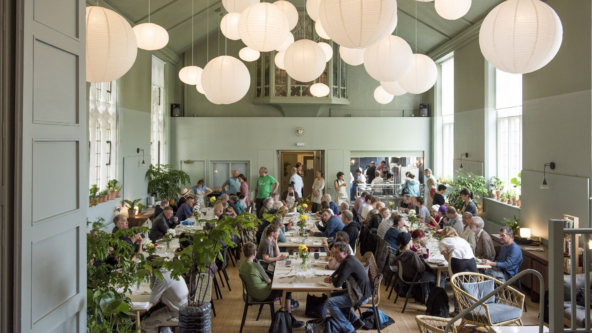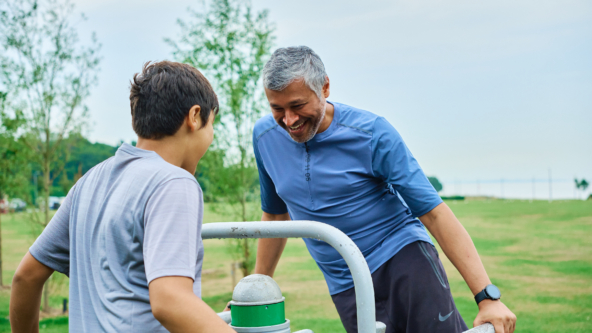Georgina Chiu of the Octopus Energy Investments Team explains how the team came together to support charities they cared deeply about, and where their business expertise gave them the insight and ability to make a real difference to a school in Kenya.
The Octopus Energy Investment team is one of the most exciting areas to work within Octopus. As a team, we share the belief that renewable energy is the present and the future, and our roles mean we get to live and breathe this every day.
Last year, it became clear that many people within the team wanted to do more to support charities that were in line with our values, in addition to the charities we support as part of the Octopus charitable foundation, Octopus Giving. While those charities are all inspirational and worthy of support in their own right, as a team we wanted to use our renewable energy expertise to do something meaningful.
This led to the creation of our own Octopus Energy Investments Charity Team.
We see it as our mission to find and support projects with a renewable energy element that we care deeply about. We want to assist organisations in the development of their own long-term renewable energy projects, and, ultimately, we hope to make a measurable impact.
Getting started
Having asked the team for suggestions for new projects, we were inundated with great ideas. The team already knew a number of suitable charities ranging from tackling energy poverty in the UK to solar projects in Africa. This was how we first heard about two charities that really deserved more of our attention.
Coco provides sustainable sources of quality education to children living in poor and marginalised communities. Meanwhile, RedTribe works with the marginalised Maasai community to improve health, education and to reduce poverty. We discovered a project that was not only fascinating, but also could benefit hugely from our partnerships and motivation to get things moving.
Introducing the Maasai Academy
Located in the remote region of Maasailand in Kenya, the Maasai Academy had humble beginnings. It started out as a small local school, set up in 2008 by the community in a disused church with only six children. Today, this wonderful school has 220 children, ten teachers and a cook, and its classes range from pre-nursery-age class all the way up to Year 8 (12-year-olds).
Each year a new classroom is built so children can move into the next year of school. In 2010, Redtribe got involved and helped to launch the Maasai Academy. Coco got onboard in 2013, by funding the building of the school’s fourth classroom.
As the school grew, more facilities were built, including a fantastic sports pitch and a kitchen. Naturally, the school’s main purpose is education, but nothing is more important than a chance for children to get out of the classroom and have fun!
Building a fully-functional educational facility
Making the school a hospitable place for children of all ages has taken time. Water supply has been a long-standing issue, especially during dry seasons. But now drip irrigation and water transportation systems are providing water used for drinking, cooking and cleaning, as well as watering the food forest which provides nutritious food for the students and generates income for the school.
This year, Coco is hoping to fund the construction of a final classroom. Dormitories have been built so that children have more time to study and play, and avoid long, often dangerous walks to and from school.
Coco also wants to build fresh accommodation to attract good teachers from further afield. Investment in teacher training will continue to further improve teaching quality.
We first heard about the Maasai Academy from one of our team members, Investment Director Simon Pickett. When Simon visited Maasailand, he fell in love with the academy, and was blown away by the amazing work already completed by Coco, and in particular, by Hennie and Becca who run RedTribe.
It was a unique situation, where there were already two high-quality charity organisations on the ground. Simon asked Coco and RedTribe what projects they already had in the pipeline and if there was anything our team could do to support the school. And the answer presented a fantastic challenge and opportunity for us.
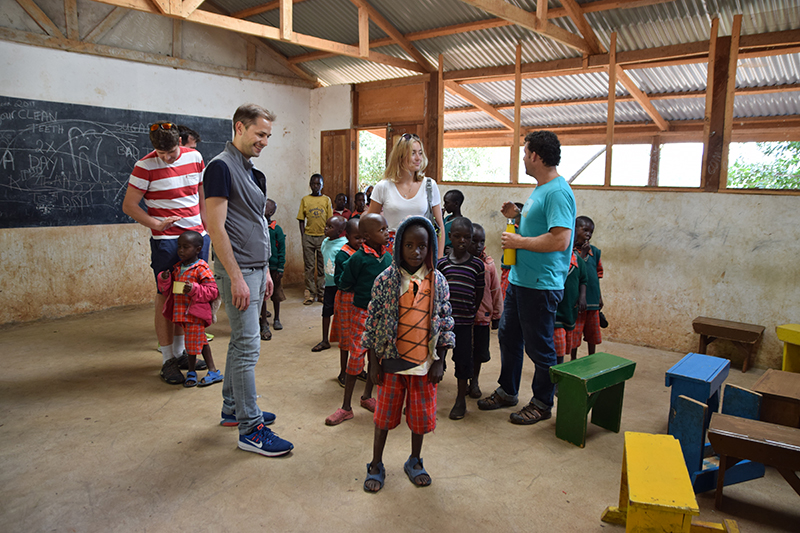
Bringing light to the school
Coco and RedTribe told Simon that unfortunately, given its remote location, the school was not connected to the main power grid. As a result, with no lighting, there was very little for the children to do after dark. Facilities such as the school’s sports pitch were effectively being wasted as soon as the sun went down.
This got us thinking: what if we could provide solar-powered lights for the sports pitch? And could this be achieved in an affordable and sustainable way, without having a negative environmental impact.
As you can imagine, the team was extremely excited at the thought of getting to grips with this project. Coming up with a solution to the Academy’s problem would not only give the children an opportunity to keep playing after dark, but it would also provide a great area for the local community to come together and use the space for other evening activities.
Having liaised closely with Hennie from RedTribe, the team found out that due to the pressures on the nomadic life of the Masaai people, many were abandoning their traditional life and settling in nearby towns. Sadly, this has resulted in many young adults getting involved in a culture of drinking and drugs.
They were very keen on the idea to set up a football club for young adults living in the area. This club would be a safer and more constructive place for them to meet and spend their time.
So, we had a project to work on, but the next question would determine whether we could achieve our objectives or not. Who would be the best partner to team up with, to bring solar lights to Kenyan Masaailand?
After some brainstorming, research and careful selection, we chose a third partner to bring into the project: Videre Global. Videre is well-known within the renewables sector for designing, building and supplying specialist equipment for off-grid energy production.
Its projects typically include the design, manufacture and supply of bespoke solar systems, including solar farms, renewable energy storage, street lighting, and energy access solutions for undeveloped energy markets.
They were the perfect group to provide the solar LED lights for the pitch, plus they also had the experience of operating in Africa, which was invaluable as our team had little experience in the space.
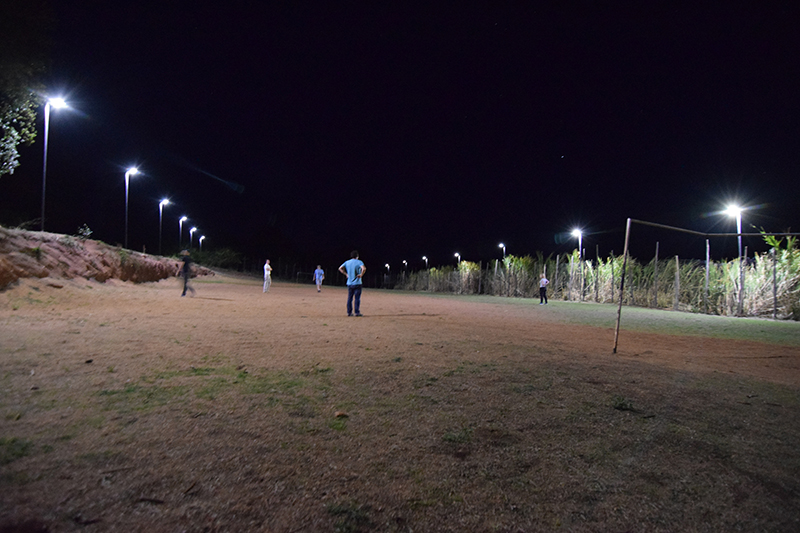
Working capital
The team had come up with a great idea, and had made the connections required needed to turn the idea into reality, but ultimately, we needed cash to make things happen. We set ourselves a fundraising target of £5,000, which would be used to purchase the solar-powered lights. Any money left over would be used to fund future Academy projects, including more sports pitches, classroom lighting and an internet connection.
We knew that Octopus Giving would kindly match the amount we raised, so the team had to raise £2,500 individually and through friends and colleagues. In the end, the team managed to raise £2,760, smashing our target, which meant we had a fundraising total of £6,460 to deploy.
We wanted to make sure there was a clear audit trail of all funds, so we transferred £5,000 to Coco, which has continued to be the main driver behind the expansion of the Maasai Academy. Part of this sum was then transferred to Videre for their lights, while the remainder was sent to RedTribe to purchase the building materials required for the lights installation.
Coco kept a small £500 pot of money, just in case it was needed.
Videre kindly donated additional lights to be used to light the pathway to the dormitories for the children, so they could feel safe walking around at night. This was a great win for the team and we were extremely grateful for Videre’s generosity and support.
We asked Red Tribe for a risk assessment on how the lights would be installed, to make sure that health and safety standards were being fully adhered to. We also sent this risk assessment to our in-house Health & Safety director for his review.
At this point, things were progressing almost too smoothly…
A taxing problem
Unfortunately, we soon realised that working on projects in other countries is never as straightforward as you might hope. We had heard from friends and colleagues that shipping in Africa can be problematic at times.
Therefore, in advance of shipping the solar-powered lights, we checked on the Kenyan government website which confirmed that solar equipment should be zero-rated for import duties and VAT.
In addition, the website stated that the goods should be considered as zero-rated as they were being shipped to a registered charity. Our understanding of Kenyan import rules confirmed, we felt we were ready to go with shipping the lights.
However, once they arrived in Kenya, they were held by the haulage company, because it was being claimed that import duties were due.
With our usual Octopus spirit in resolving issues, and in order to avoid paying further taxes, we spoke with:
- The owner of the haulage company to waive storage costs
- The Kenyan government to register as a renewable installer
- The Church that supports RedTribe to claim the charity exemption for imports
- The UK government
We were advised that it would be best to pay the import duties and storage costs, and then reclaim the tax after, a solution that would avoid further delays in the installation of the lights. But we were racing against the clock, and the weather.
We knew that once the lights were released, it would still take a couple of weeks for them to reach the Masaai Academy, due to seasonal floods. Hennie from RedTribe told the team that he lives 72 miles from the nearest town or tarmac road.
Because of the rains, it was taking at least four hours to drive to the nearest town or petrol station.
Sunshine in the dark
Once the rains subsided, RedTribe quickly got to work and managed to put up the lights. The team was happily surprised with pictures of the sports pitch. Hennie said that there was a really positive reaction from the children and the villagers.
Some have said that the village has now become a ‘city’ because of the bright lights. All the while, without the use of fossil fuels.
Everyone in the team is hugely proud of the contribution we made to this project. We’re also hugely grateful to all our sponsors and donors whose generosity helped to make it happen. Now that the lights have been installed, we’re talking to both Coco and RedTribe to decide where we can help out next.
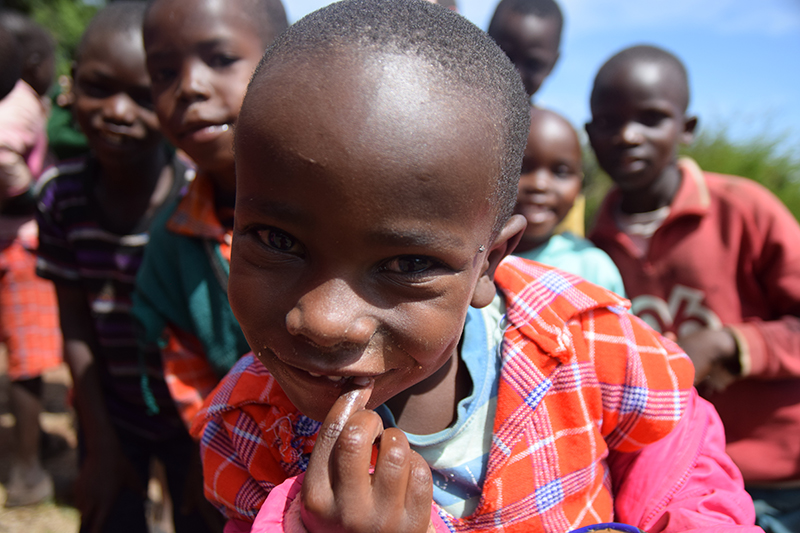
But we are always looking for new projects and to form new partnerships. So, if you have a project that could use a team of volunteers, funding or expertise, please feel free to contact the team at oei.charity@octopusinvestments.com

